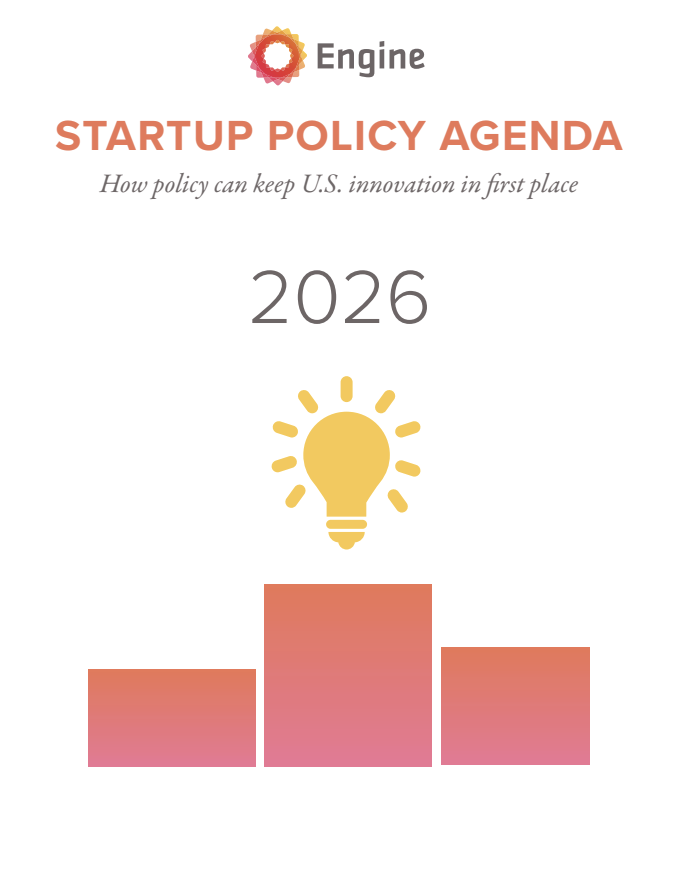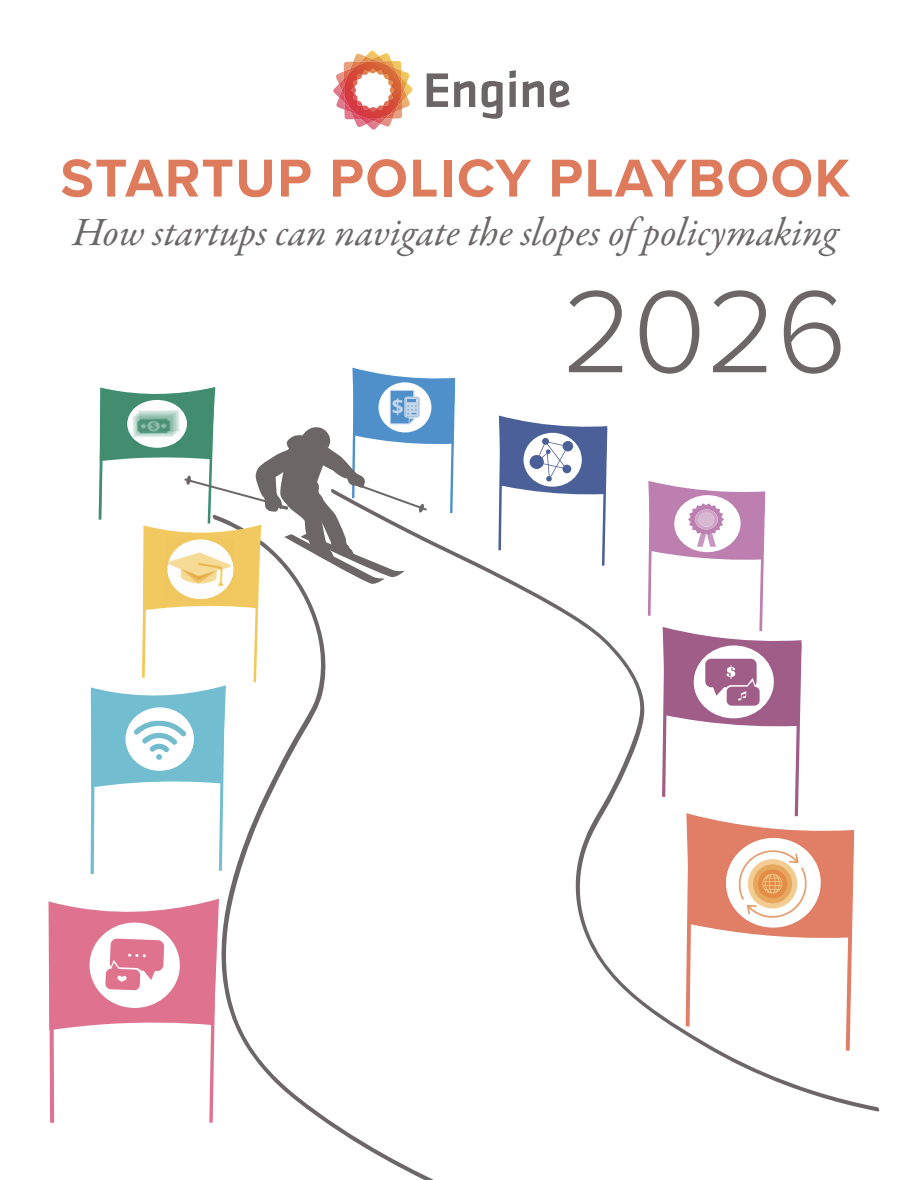Today, Engine published the 2026 Startup Policy Agenda, highlighting the policy issues coming up this year that will impact startups.
Engine releases Startup Policy Playbook for 2026
Tech, Trade, and Tariffs: the consequences of erecting barriers to startup success
Mapping the future: charting the AI ecosystem & a policy blueprint for startup success
Engine releases 2025 Startup Agenda
Engine released the 2025 Startup Policy Agenda showcasing how smart, thoughtful policy facilitates and encourages startup activity, leading to more innovation and more economic and job growth. The Agenda gives those working on policy an overview of the issues that are currently impacting—and the debates that stand to impact—startups.
Engine releases Startup Policy Playbook for 2025
Engine released the 2025 Startup Policy Playbook to give members of the startup ecosystem—founders, employees, investors, and support organizations—an overview of the policy conversations happening this year and how they can get involved in amplifying the startup voice. There’s lots to do, and lots to do better, and this playbook highlights why shaping innovation-friendly policies matters to startups.
Engine releases additional resources on startups and age verification
Engine releases report on how determining user age impacts startups
Engine releases Startup Policy Playbook for 2024
Engine released the 2024 Startup Policy Playbook, to help give members of the startup ecosystem—startup founders and employees, investors, and support organizations—an overview of the policy conversations happening this year and how they can get involved in amplifying the startup voice.
Engine releases 2024 Startup Agenda
Engine released the 2024 Startup Policy Agenda, highlighting for policymakers the issues impacting the startup ecosystem, including the startup companies, investors, and support organizations across the country. The Agenda features startup founders discussing in their own words the obstacles they’ve faced as they launch new and innovative businesses and the ways policies have helped and hurt them.
Engine releases report on Privacy Patchwork Problem
Data privacy has been top of mind for consumers, policymakers, regulators, companies, and entrepreneurs for the past several years, in the wake of broad privacy rules in the EU, and action in several U.S. states. The U.S., which has long had a sectoral approach to privacy, remains without a comprehensive privacy framework, and many states have reacted by proposing, passing, and implementing their own varying—and potentially conflicting—comprehensive privacy laws.
Engine releases Startup Policy Playbook for 2023
Engine releases 2023 Startup Agenda
Engine's Startup Policy Agenda for 2023 highlights the voices of those startup companies, investors, and support organizations as they discuss in their own words the obstacles they face and the ways policies have helped and hurt them. We hope it serves as a high-level overview of the issues we hear about from startups every day and a jumping off point for policymakers looking to support the technology industry's small businesses.
Engine and CCIA release Tools to Compete Report
The startup ecosystem is an interdependent system of startups, support organizations, investors, service providers, and others working to support startup growth and success through the provision of guidance, capital, and other critical resources. Each of these components is critical to the success of individual startup ecosystems all across the country and the growth of the overall U.S. startup ecosystem.
Engine Releases Report on the Role of Acquisitions in the Startup Ecosystem
The U.S. startup ecosystem is defined by dynamism. Startups are constantly being founded, earning investment, growing, exiting, and—yes—failing in cities and towns all across the country. Startup exits and investment are two intimately related and important drivers of this dynamism critical to economic growth and innovation in the startup ecosystem. Startup exits—both those that are profitable and those that are not—promote the building of knowledge, recycling of talent, and flow of capital through the ecosystem. Each of those components are key to building new startups and stimulating the investment needed to grow them to scale.
Engine Releases Policy Roadmap for Supporting Startups Everywhere
Today, Engine issued a paper focused on the policy insights needed—and the legislative actions required—to adequately support the expanse of the startup ecosystem, and to grow the innovation economy. We hope this paper can serve as a resource for policymakers considering a wide range of policy issues that impact early-stage companies across the country.
Engine Releases 2022 Startup Agenda
Heading into 2022, several technology policy debates are already underway in Washington, D.C. As always, Engine aims to be a resource in those conversations, surfacing the startup perspective and highlighting the voices of startup founders who are running small businesses, creating jobs, and building new and innovative products and services. This agenda is a high-level overview of the issues we hear about from startups every day and a jumping off point for policymakers looking to support the technology industry's small businesses.
Startups, Content Moderation, and Section 230
Debates about the intermediary liability framework provided by Section 230 have animated policy conversations as lawmakers grapple with harmful online content, including around election integrity, health information, and children’s safety. But those debates are almost exclusively focused on the largest Internet companies. Section 230, however, applies to all services of all sizes that host all types of user-generated content, including startups.
Startups & the U.S. Patent System: Prioritizing Quality and Balance to Promote Innovation
Engine has released a new report that outlines why it is so important for the government to prioritize quality and balance when it comes to patent policy.
Engine Releases Report On the State of the Startup Ecosystem
Today, Engine, along with the Charles Koch Institute and Startup Genome, issued a report looking at the overall health of the startup ecosystem. We hope this report can serve as a resource for policymakers considering a wide range of policy issues that impact early-stage companies across the country.
























